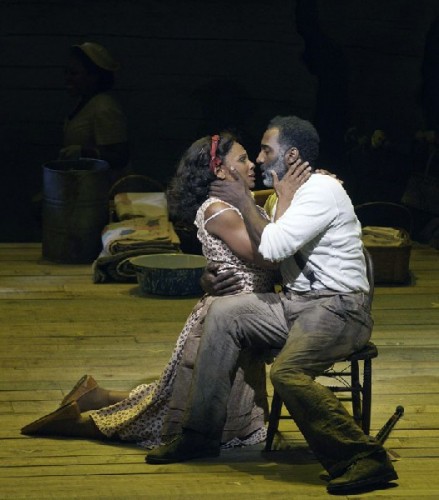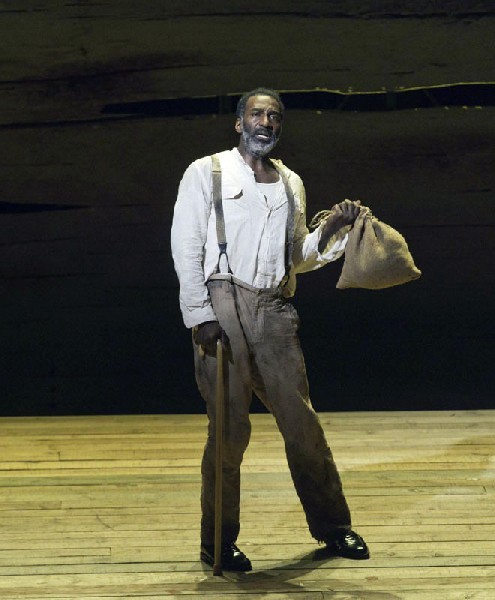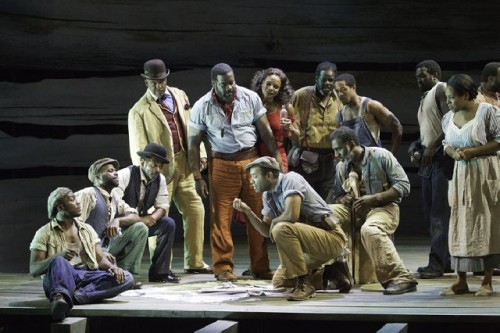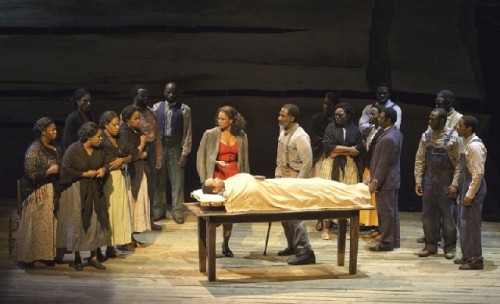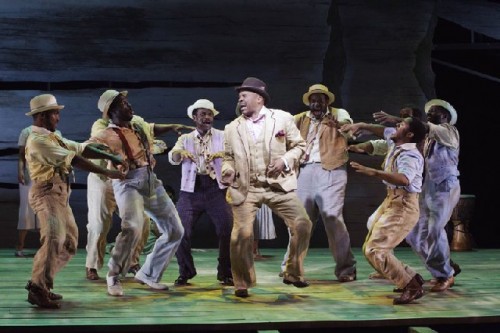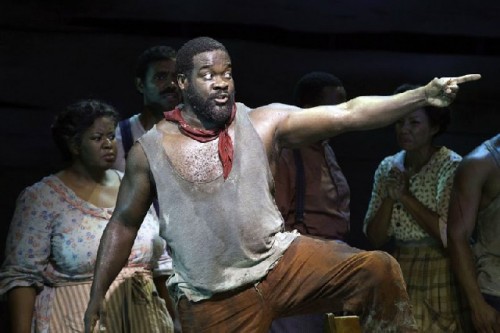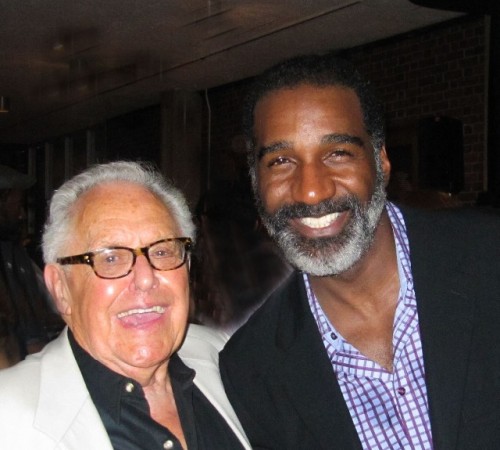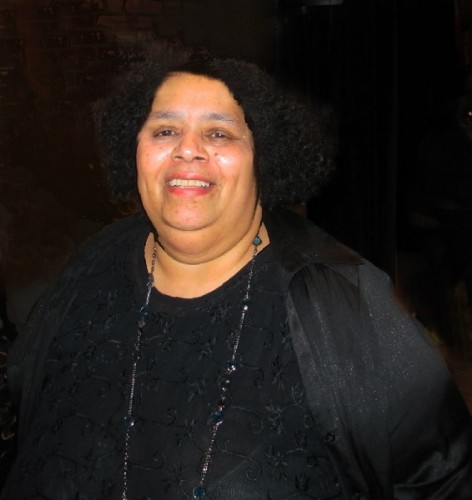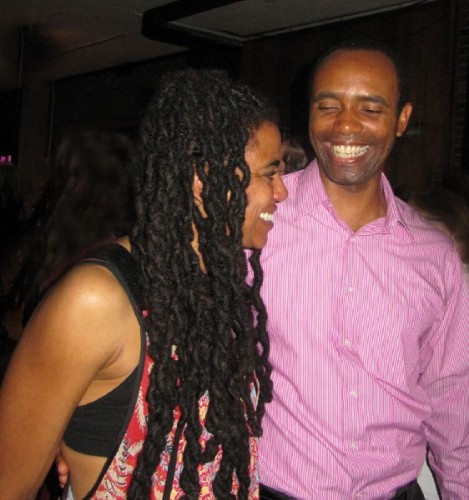The Gershwin’s Porgy and Bess at ART
Audra McDonald and Norm Lewis Sizzle
By: Charles Giuliano - Sep 02, 2011
The Gershwin’s Porgy and Bess
By George Gershwin, Dubose and Dorothy Heyward and Ira Gesrhwin|
Adapted by Suzan-Lori Parks and Diedre L. Murry
American Repertory Theatre
Through October 2, 2011
Directed by Diane Paulus
Choreographer Ronald K. Brown
Scenic Design, Riccardo Hernandez; Costume Design, Esosa, Lighting Design, Christopher Akerlind, Sound Design, Acme Sound Partners; Orchestrators, William David Brohn and Christopher Jahnke; Conductor, Shilah Walker; Associate Conductor, Brian Hertz; Casting, Telsey + Company; Associate Director. Production Stage Manager, Nancy Harrington
Cast in Order of Appearance: Nikki Renee Daniels (Clara) , Natasha Yvette Williams (Mariah), Cedric Neal (Frazier, the Crab Man), Heather Hill (Lily), Joshua Henry (Jake), J.D. Webster (The Undertaker), David Alan Grier (Sporting Life), Nathaniel Stampley (Robbins), Broyonha Marie Parham (Serena), Norm Lewis (Porgy), Phillip Boykin (Crown), Audra McDonald (Bess), Phumzile Sojola (Peter, the Honey Man), Christopher Innvar (Detective), Joseph Dellger (Policeman), Andrea Jones-Sojola (Strawberry Woman) Roosevelt Andre Credit, Trevon Davis, Wilkie Ferguson (Fishermen), Allison Blackwell, Alicia Hall Moran, Lisa Nicole Wilkerson (Women of Catfish Row)
Orchestra: Sasha Callahan, Ashleigh Gordon, Leo Eguchi, Joe Higgins, Brian Hertz, Ebonee Thomas, Mie Shiraishi, Bob Bowlby, Peter Cokkinias, Rosyln Black, Diantha Millott, John Replogle, Greg Smith, Martin Wittenberg, Don Robinson, Greg Newton, Roberto Cassan.
I loves you Porgy. And Bess. No make that The Gershwin’s Porgy and Bess.
When Stephen Sondheim fired off a letter to the New York Times protesting tampering with an American Masterpiece audiences were put on alert to anticipate a travesty. On opening night this week of The Gershwin’s Porgy and Bess the artistic director of American Repertory Theatre, Diane Paulus, nixed those concerns in a triumph that had the audience hottin,' hollerin' and stomping through a Standing O and numerous curtain calls.
This adaptation of what is regarded as The Great American Opera has been overhauled, updated for prime time, and lightened up just enough to be Broadway bound in December. The Cambridge production starring the magnificent pairing of Audra McDonald and Norm Lewis is just about sold out.
Riding the tidal wave of media attention, fueled by that spark of controversy from Sondheim, in December this production hits Broadway like a tsunami. On opening night, yes folks, the excitement and energy was that palpable.
Under Paulus the Harvard based theatre company has been transformed from avant-garde and elitist to populist to the max. No longer a precious liability for the university it is now a cash cow and haven for theatre mavens. Now ART audiences don't emerge from the theater stratching their heads. Well, perhaps now and then.
Originally Paulus came to Cambridge from Broadway with a Tony for her revival of Hair. Now she appears to be sending an even better show to New York and will surely be nominated for her efforts. McDonald is also a likely front runner for another Tony award. Nothing greater enhances the pizzazz of a regional theatre company than sending its productions to Broadway.
With amazing serendipity we experienced a concert version of the unadulterated opera, well with just a couple of tweaks, at Tanglewood. It featured the full BSO orchestra and 100 plus singers of the Tanglwood Chorus as well as a magnificent cast of superb singers.
This provided the unique opportunity to compare and contrast. At Tanglewood Nicole Cabell, soprano (Clara), was stunning in her crystal clear rendering of the signature “Summertime.” Nikki Renee Daniels was charming but less spectacular in the role. But her performance won over the audience as she sang to a real live, baby boy. We delighted in the synergy.
Also Tanglewood had a truly astonishing Sporting Life in Jermaine Smith. A slender, agile dancer as well as singer he slithered about in a smarmy, satanic manner. Giving a coy, slurry, hipster rendering of his retort to Bible speak in “It Ain’t Necessarily So.” With pimped out, prancing moves it was easy to comprehend a treacherous hold on Bess and the addictive lure of his happy dust.
The Sporting Life of David Alan Grier at ART was adequate but more of a stretch. While Smith was born to play Sporting Life with Grier it seemed to allign with the extreme makeover of the Paulus production and its striving for less caricature and more naturalism. Here and there it worked but less so with this key character.
In Cambridge he was a country version of a city slicker. In the costume design by Esosa his pimp duds looked well worn and less than the requisite, flashy, outrageous “fresh.” The adapted story line has him on hiatus from the Apple laying low on Catfish Row. There to roll the bones, sell happy dust, and pimp on the side. Other than Crown and Bess, however, he appears to have few clients for his blow and not much luck with the low stakes of shooting craps. There is not much prospect of feeding off of poor, God fearing fishermen. In his big numbers Grier lacked the slick moves of a great Sporting Life.
There were indeed a number of distractions. This is, after all, ART. Even given the populism of Paulus the venerable theatre has its edgy reputation to defend.
During the overture we contemplated a curtain that simulated the texture of blown up birch bark. As Clara sang "Summertime" in front of the curtain through back light we began to see the stage. The curtain was raised to reveal a curved space surrounded by a birch-like enclosure designed by Riccardo Hernandez. It was more of a signifier than simulacrum of Catfish Row. The changes of scene occurred within this ersatz dreamscape. During the hurricane a side of the set lifted to reveal a shower of water into which Clara plunged to find her drowning husband followed by Crown.
The ominous theme of an impending hurricane was all too timely. We truly feared for Jake and his fishermen as they sang a Gershwin adaptation of a call and answer work song "It Takes a Long Pull to Get There."
At the controversial ending of the play, experimented with in previews and then reconfigured for opening night, the set raises as Porgy, sans goat cart but avec cane, stumbles off to find his Bess.
Theatre is a living art form with a mandate to rethink and update the classics. When you mess with tradition and received expectations there are bound to be tradeoffs. The social and political context for the opera, as first staged in 1935, is inevitably different from today. The intention of this production as adapted by Paulus, in collaboration with the playwright Suzan-Lori Parks and composer Diedre L. Murray, has been to make the characters less caricatured and more credible.
While the set implies a surreal take on Catfish Row, the costumes are true to the economics and period of the characters. So there is a kind of tension between fantasy and reality. How to be true to a classic but also allow the actors to be comfortable and credible in their roles.
Listening attentively the language and tone did not seem different from what we heard at Tanglewood. One anticipated, perhaps, that we would hear “Bess you are my woman now.” Or “I love you Porgy.” The detective (Christopher Innvar) is still referred to as “boss.” One would have to study a before and after of the script to find all of the changes and upgrades.
The most obvious revision/ rehabilitation occurs with the treatment of Bess (Audra McDonald). She is a very beautiful, glamorous woman. This production makes a great effort to scuff her up. We were shocked to note the gash and scar of a razor slash on her cheek. It left no doubt that she is a battered woman kept and abused by Crown (Phillip Boykin). There appears to be a matted wig instead of her own hair. The red dress with a thigh revealing slit is less slutty than one expects for a fancy woman.
McDonald spends most of the evening conveying furtive, frenzied, insecure and even terrified emotions. Much is made of her vulnerabilty. The happy dust eases the pain of a horrific life. There is not a hint of the enticing eroticism and glamour that makes her the object of desire of the three dominant males in the drama: Crown, Porgy and Sporting Life.
The effort to humanize Bess and relocate her in a contemporary feminist context as a battered woman throws off the chemistry of the production. It is much less Porgy and Bess and a whole lot more just Bess. It is not a moot point that this production is a collaboration between three women as director, playwight, and musical director. This is a work by and for women to which men, oh well, are also invited. If they behave.
Just where does that leave Porgy as magnificently played by Norm Lewis? He is derided by Crown as a “cripple.” Thank heavens not a “handicapped person” or “movement challenged.” This is, after all, set in the 1930s.
Handicapped at birth Porgy is a beggar who has never known the pleasures of a woman. Lewis makes a great effort to convey his physical challenges. Other than the bad legs, however, from the waist up Porgy is easy on the eyes. It is perhaps too obvious to discern what Bess would see in him rather than just shelter in the storm. After Crown kills a man during the gambling scene he’s on the lam and as his woman Bess is implicated. The God fearing community shuns her as a sinner and tramp. Only Porgy opens his door to her.
With wonderfully understated, underplayed nuance we see Porgy evolve from Samaritan to lover. In their great duet he finds his way tentatively not believing what he is professing. There is a similar hesitance with Bess until they truly embrace and accept each other as lovers. It was a spine tingling moment overwhelmed by the majesty of their singing. In that sense Lewis is an inspired match and equal to McDonald. While the production and its feminist/ restorative agenda focused on McDonald’s paradigmatic Bess, Lewis more than holds his own with a powerful voice and compelling performance.
In Phillip Boykin this production has the best possible Crown. From his first moment on stage he was terrifying and menacing. His strong physical presence was enforced by a deeply resonant voice of operatic quality. Boykin embodies the rarest of assets, superb acting, combined with a boomingly powerful voice.
He scared the willies out of us and not just Bess. The rape scene on the deserted island was riveting and harrowing in its graphic realism. One could not imagine such a scene on stage at the Metropolitan Opera.
That lent compassion and credibility when Bess staggers into Catfish Row having escaped Crown and the island. We are led to believe that she trudged for hours through the muck of low tide. She is wearing a mud spattered slip when she collapses in fever.
The entire plot line of this revised production is about the humanizing and rehabilitation of Bess. The evil, cocaine addicted whore is gradually accepted by the community as the woman of Porgy. During the picnic scene, with stunning choreography by Ronald K. Brown, she is accepted and embraced by the God fearing righteous women. When Clara charges off to find her man she entrusts Bess with her baby.
In a reprise of “Summertime” we see Bess embracing being a mother to the orphan and forming a family with Porgy. This delusion of domestic bliss is soon shattered by the return of Crown and the temptations of Sporting Life with his happy dust.
The overzealous rehab of Bess, however, reveals the fault line of the Paulus version. In previews there was a buzz about a “happy ending.” Instead of being lured away by Sporting Life, Bess returns to live with Porgy. He has been taken off for interrogation as a suspect in the murder of Crown.
Seizing the opportunity, with Crown dead and Porgy in jail, Sporting Life makes his move. He offers Bess some blow with the offer of more where that comes from. He’s off for New York with the great aria “There’s a Boat That’s Leaving Soon.”
But this is all off key. Bess, now lured by the respectable, clean living life is resistant to the cure all happy dust. She snorts reluctantly. Then in a scene which seems like a hangover of the botched attempt at a new ending we see Bess throw away the vial of coke that Sporting Life has given her. It caused the women in front of me to cheer.
That approach plays better in Oprah than Opera. It make us feel good about Bess for getting off drugs but it sure messes with the finale. Why would a now clean Bess run off with a pimp? This sets up the return to Porgy which now doesn’t happen. Of course the fate of Porgy for the murder of Crown is uncertain. Who else but Sporting Life offers her security?
That aborted happy ending would screw up the great Gershwin finale of “I’m on My Way.” Why would Porgy leave if Bess returns? Dianne, what were you thinking? Here’s a thought, give Bess back the happy dust. Tough on Bess but better for the audience. It just makes more sense.
That’s just a quibble. It’s what critics do. But there’s no taking away from the bottom line. This is a kick ass, rip snorting, juggernaut of a Broadway bound smash hit. With some of the greatest American music ever composed this is a dynamite blockbuster.
Unless like that spoil sport Sondheim you conclude that it ain't necessarily so.

